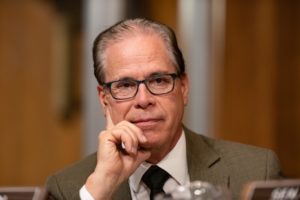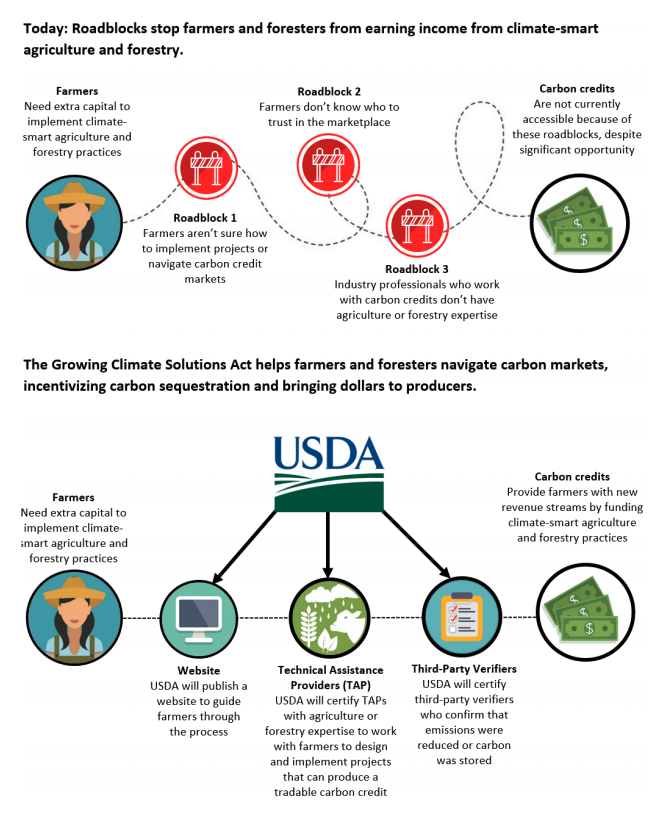Aug 3, 2020Bills in House, Senate would incentivize climate-smart farming practices
In June, a bipartisan group of U.S. Senators introduced the Growing Climate Solutions Act, a bill designed to incentivize climate-smart farming practices for growers and ranchers.
The bill, sponsored by Senators Mike Braun (R-Indiana), Debbie Stabenow (D-Michigan), Lindsey Graham (R-South Carolina) and Sheldon Whitehouse (D-Rhode Island) is designed to “break down barriers for farmers and foresters interested in participating in carbon markets so they can be rewarded for climate-smart practices.”

It has drawn support from more than 40 farm groups, including the American Farm Bureau Federation, National Farmers Union and American Soybean Association, as well as an array of Fortune 500 companies, including Microsoft, McDonald’s, Syngenta, Bayer, Cargill and Nutrien.
A corresponding bill was introduced into the House on June 26 by a bipartisan group of Representatives, led by Rep. Abigail Spanberger (D-Virginia).
Below is a statement from Sen. Braun’s office:
“Agricultural practices and land management decisions play a key role in the discussion surrounding global greenhouse emissions and climate policy. The agriculture and forestry sectors hold the potential to serve as a critical climate solution. At scale, agriculture and land use practices can sequester carbon at as low as $10 per MtCO2e, making it the most cost-effective carbon sequestration method currently available.
“Carbon credits are traded in both compliance and voluntary markets globally. Traditionally, compliance markets have seen more transaction volume of the two. But more recently, as companies and individual actors increasingly seek to offset emissions, activity in voluntary carbon markets has increased exponentially. Correspondingly, the volume of credits generated through forestry and land use activities is growing rapidly, increasing 264% between 2016 and 2018, more than 12 times the increase of other credit types.
“However, for producers and private forest owners, access to carbon markets is often too difficult and convoluted to achieve wide adoption. Further, the significant demand for land-based climate solutions cannot presently be fully incentivized by government as political and fiscal constraints in Washington limit the federal government’s ability to be the sole leader in promoting conservation and sustainable land-use practices. Thus, there is an inherent need for legislation that outlines the appropriate federal role — one that will complement existing efforts, make it easier for producers to participate, and allow the private sector to flourish in meeting market-based demands for carbon credits.
About the bill
“The Growing Climate Solutions Act creates a certification program at USDA to help solve technical entry barriers to farmer and forest landowner participation in carbon credit markets. These issues — including access to reliable information about markets and access to qualified technical assistance providers and credit protocol verifiers — have limited both landowner participation and the adoption of practices to help reduce the costs of developing carbon credits.
“To address this, bill establishes a ‘Greenhouse Gas Technical Assistance Provider and Third-Party Verifier Certification Program’ through which USDA will be able to provide transparency, legitimacy, and informal endorsement of third-party verifiers and technical service providers that help private landowners generate carbon credits through a variety of agriculture and forestry related practices. The USDA certification program will ensure that these assistance providers have agriculture and forestry expertise, which is lacking in the current marketplace. As part of the program, USDA will administer a new website, which will serve as a “one stop shop” of information and resources for producers and foresters who are interested in participating in carbon markets.
“Through the program, USDA will help connect landowners to private sector actors who can assist the landowners in implementing the protocols and monetizing the climate value of their sustainable practices. Third party entities, certified under the program, will be able to claim the status of a ‘USDA Certified’ technical assistance provider or verifier. The USDA certification lowers barriers to entry in the credit markets by reducing confusion and improving information for farmers looking to implement practices that capture carbon, reduce emissions, improve soil health, and make operations more sustainable.
“Today, many third-party groups are developing protocols and testing methods to calculate emissions reduction and sequestration in agriculture and forestry. The landscape is evolving rapidly. The Growing Climate Solutions Act recognizes this fact and provides the Secretary with a robust advisory council composed of agriculture experts, scientists, producers, and others. The advisory council shall advise the Secretary and ensure that the certification program remains relevant, credible, and responsive to the needs of farmers, forest landowners, and carbon market participants alike. Finally, the bill instructs USDA to produce a report to Congress to advise about the further development of this policy area including: barriers to market entry, challenges raised by farmers and forest landowners, market performance, and suggestions on where USDA can make a positive contribution to the further adoption of voluntary carbon sequestration practices in agriculture and forestry.”















